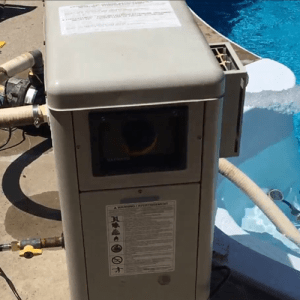 Why do pool heaters leak? Why are my pool heater lines leaking? Why does my gas pool heater keep leaking water onto the ground? There are many reasons why your pool heater might be leaking. Pool heaters can leak for many reasons including rust, faulty seals at joints in pipes, and metal fatigue. These can cause leaks in any size or type of gas or electric pool heater.
Why do pool heaters leak? Why are my pool heater lines leaking? Why does my gas pool heater keep leaking water onto the ground? There are many reasons why your pool heater might be leaking. Pool heaters can leak for many reasons including rust, faulty seals at joints in pipes, and metal fatigue. These can cause leaks in any size or type of gas or electric pool heater.
Typically rust chips returned from thousands of gallons of heated saltwater return to their point of origin: The bottom where there’s a good chance that they’ll fall right into an open flame. A leaky pipe can allow them back in without adding any additional energy costs by simply turning off one valve and leaving all others turned on.
There can be several reasons why your pool heater is leaking. Here are a few common causes:
- Loose or damaged connections: Check the connections between the heater and the pool’s plumbing system. If any connections are loose, damaged, or worn out, they can cause leaks.
- Corrosion: Over time, the internal components of the pool heater, such as pipes, valves, or heat exchangers, can corrode due to exposure to water and chemicals. Corrosion can lead to leaks in the system.
- Pressure issues: If the pressure inside the pool heater is too high, it can cause the unit to develop leaks. This could be due to a malfunctioning pressure relief valve or a problem with the pressure switch.
- Cracked or damaged components: Pool heaters have various components, such as heat exchangers, headers, or pipes, that can develop cracks or other forms of damage. These defects can result from factors like age, freeze damage, or excessive pressure, leading to leaks.
- Faulty seals or gaskets: Seals and gaskets are used to create watertight connections within the heater. If these components become worn, brittle, or damaged, they may not effectively seal the joints, causing leaks.
- Improper installation: If the pool heater was not installed correctly, it can contribute to leaks. Poorly connected pipes, improperly fitted seals, or incorrect alignment of components can all lead to water leakage.
To address the issue, it’s best to consult a professional pool heater technician or plumber who can diagnose the specific cause of the leak and provide appropriate repairs or replacements. Remember, working with pool heaters involves dealing with gas, electricity, and water, so it’s essential to prioritize safety and seek professional assistance.
Broken impeller blade, heat exchanger plate, or insulation blanket. And in rare cases, it may be caused by a defective heating element that is shorted out internally and leaking electricity onto the outside of the unit where it arcs over to another metal part which causes an external leak on the exterior tank body! If you can’t get your pool heater leaking water from the bottom fixed right away, at least plug up your pool drainage system so that all of this excess water doesn’t cause problems with erosion or flooding.
